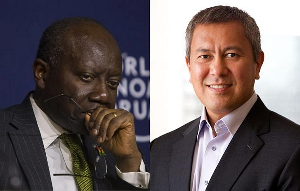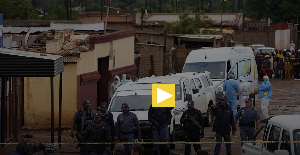John K. Akpalu, Esq.
Wednesday, January 3, 2013
Thanks to the open skies policies adopted by African countries after the Yamoussoukro Decision of November, 1999, Ghanaians can now fly from Accra to Kumasi for a one-way fare of about $25 (GHC50). There are also cheap flights to and from other cities in the West African sub-region for relatively low fares.
As the saying goes, however, whatever comes cheap may prove dear in the end. It is expensive to run an airline. There are government permits to pay for, in addition to airport taxes, landing fees, fuel costs – which are more expensive in Africa than in Europe - maintenance costs, wages and salaries for the crew and staff, training costs and aircraft lease payments. And these costs must be met with room for a decent profit margin for the airline - all from the discounted fares.
The inevitable result of doing much with little will be aviation accidents resulting in multiple losses of lives. Low cost passenger and cargo airlines will be forced to buy or lease old airplanes in order to reduce lease payments and acquisition costs. The victims of the Allied Air plane crash in Ghana on June 2, 2012, whose families I am representing, were killed by an old Boeing 727 which was withdrawn from use and mothballed in December 1991 after flying for the old Pan-Am Airways for 22 years. That plane was sold to various entities until it was finally acquired by Allied Air Cargo and registered in Nigeria for cargo service.
After the Allied Air plane crash in Ghana on June 2, 2012, the very next day, there was Dana Air Crash in Lagos Nigeria taking 153 lives on the flight and 10 lives on the ground. Preliminary investigations showed that the plane had dual engine failure without any external factor such as a bird strike. There was also a finding that there was no fuel contamination. About 17 minutes into the flight, the Captain and First Officer observed a discrepancy between the engine throttle setting and the engine power indicator but continued the flight without signaling any trouble. The result was the subsequent crash in Lagos. Whether the crash was due to pilot error or maintenance issues will eventually be determined.
At the dawn of commercial aviation, flying was considered an ultra hazardous activity and was regulated as such. Today, thanks to improvements in aircraft design and maintenance, flying is considered mostly safe. Accidents however, continue to happen due to the three “poors” – poor cockpit management, poor airline company safety culture and poor training and cockpit crew skill upgrade.
Ghana must be commended for adhering to her open skies commitments. Open skies agreements allow airlines to become more efficient by providing more affordable, effective and convenient services to their passengers. Countries do this by eliminating or reducing government restrictions on commercial decisions by airlines regarding routes, capacity and pricing.
The government of Ghana through the Ministry of Transport and the Ghana Civil Aviation Authority has a responsibility to ensure that air travel is safe for Ghanaians. Airlines must be made to carry adequate liability and third party insurance to cover personal injuries and death to passengers and non-flying third parties. Maintenance logs must be scrupulously and frequently checked to ensure that airlines meet acceptable standards. Landing rights and permits must be denied to airlines with serious and repeated safety violations. Government must also ensure that airlines comply with international training standards for the cockpit crew and flight staff; and with limitations on continuous flight time to reduce incidences of pilot error due to fatigue.
Day in and day out, Ghanaians are met with the inability of their government to control carnage on our roads by preventable motor vehicle accidents. We hope that the Ministry of Transportation and the Ghana Civil Aviation Authority will do a better job of policing our skies.
John K. Akpalu, Esq., LL.M. (Harvard). The writer is a practicing attorney with offices in New York and Accra. He can be reached at jakpalu@gmail.com.
Opinions of Friday, 4 January 2013
Columnist: Akpalu, John K.














